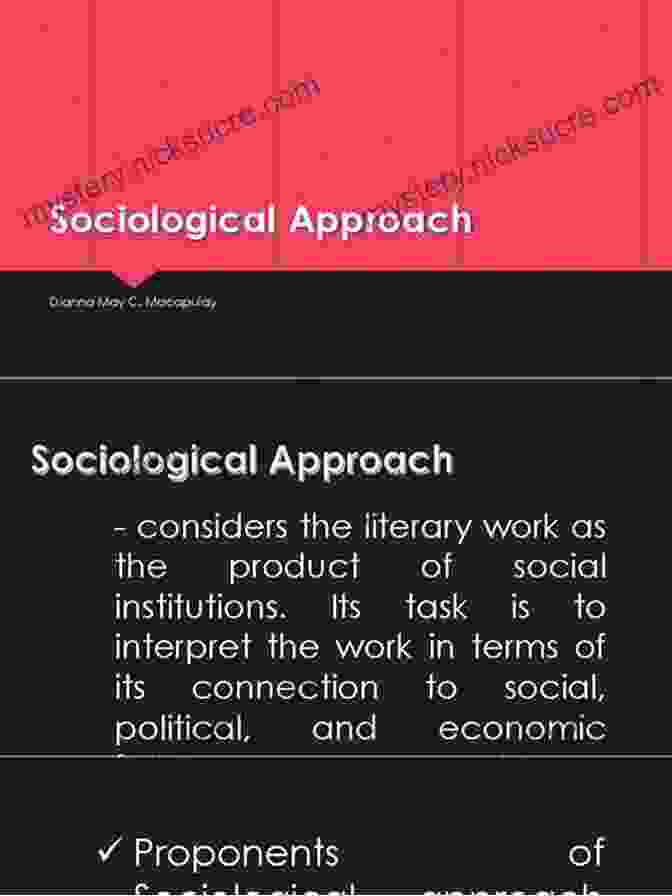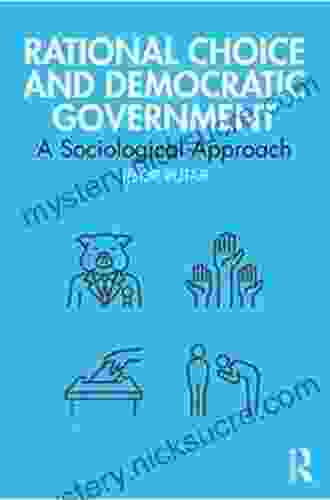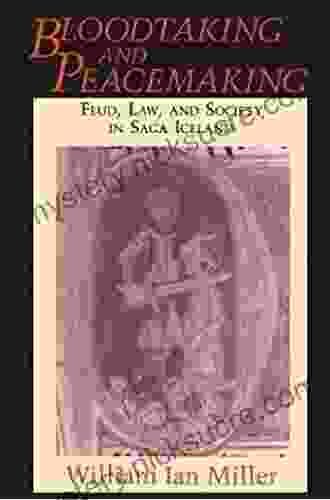Sociological Approaches to Political Power: A Comprehensive Guide


Political power is a central concept in sociology, with sociologists offering a diverse range of theoretical perspectives on how it operates. This article provides a comprehensive overview of sociological approaches to political power, including theories, empirical research, and recent developments in the field. It explores the role of social structures, institutions, and individual actors in shaping political outcomes.
4.3 out of 5
| Language | : | English |
| File size | : | 1889 KB |
| Text-to-Speech | : | Enabled |
| Screen Reader | : | Supported |
| Enhanced typesetting | : | Enabled |
| Word Wise | : | Enabled |
| Print length | : | 160 pages |
Theoretical Perspectives
Sociologists have developed a variety of theories to explain the nature and dynamics of political power. These theories can be broadly categorized into three main perspectives:
- Structuralist Perspectives focus on the role of social structures, such as class, gender, and race, in shaping political power. These theories argue that power is embedded in social institutions and structures, and that individuals' access to power is largely determined by their position within these structures.
- Institutionalist Perspectives focus on the role of political institutions, such as the state, political parties, and interest groups, in shaping political power. These theories argue that institutions provide the framework for political action, and that they can both empower and constrain individuals and groups.
- Individualist Perspectives focus on the role of individual actors in shaping political power. These theories argue that power is not simply a structural or institutional phenomenon, but is also shaped by the choices and actions of individuals. They emphasize the importance of agency, leadership, and political mobilization.
Empirical Research
Sociologists have conducted extensive empirical research to test and refine theories of political power. This research has focused on a wide range of topics, including:
- The distribution of political power across different social groups
- The role of political institutions in shaping political outcomes
- The relationship between political power and economic inequality
- The impact of political power on social movements
This research has provided valuable insights into the nature and dynamics of political power, and has helped to refine and develop sociological theories of power.
Recent Developments
In recent years, there have been a number of new developments in the field of sociological approaches to political power. These developments include:
- A growing emphasis on the role of culture in shaping political power
- The development of new theoretical perspectives, such as post-structuralist and feminist theories of power
- The use of new research methods, such as network analysis and qualitative interviews
These developments have helped to broaden and deepen our understanding of political power, and they are likely to continue to shape the field in the years to come.
Sociological approaches to political power provide a valuable framework for understanding how power operates in society. These approaches offer a diverse range of theories, empirical research, and recent developments that can help us to better understand the nature and dynamics of political power, and its impact on society.
4.3 out of 5
| Language | : | English |
| File size | : | 1889 KB |
| Text-to-Speech | : | Enabled |
| Screen Reader | : | Supported |
| Enhanced typesetting | : | Enabled |
| Word Wise | : | Enabled |
| Print length | : | 160 pages |
Do you want to contribute by writing guest posts on this blog?
Please contact us and send us a resume of previous articles that you have written.
 Fiction
Fiction Non Fiction
Non Fiction Romance
Romance Mystery
Mystery Thriller
Thriller SciFi
SciFi Fantasy
Fantasy Horror
Horror Biography
Biography Selfhelp
Selfhelp Business
Business History
History Classics
Classics Poetry
Poetry Childrens
Childrens Young Adult
Young Adult Educational
Educational Cooking
Cooking Travel
Travel Lifestyle
Lifestyle Spirituality
Spirituality Health
Health Fitness
Fitness Technology
Technology Science
Science Arts
Arts Crafts
Crafts DIY
DIY Gardening
Gardening Petcare
Petcare Michael Chatfield
Michael Chatfield David Martin
David Martin Linda Rosenkrantz
Linda Rosenkrantz Tim Glover
Tim Glover Jonathan T Gilliam
Jonathan T Gilliam Michael Tan
Michael Tan Celeste Headlee
Celeste Headlee Lily Raff Mccaulou
Lily Raff Mccaulou Pamela Weintraub
Pamela Weintraub Justin Coulson
Justin Coulson Sarah Jacoby
Sarah Jacoby Sheri Morehouse
Sheri Morehouse Donna R Causey
Donna R Causey Sheila A Sorrentino
Sheila A Sorrentino Robert Walker
Robert Walker Robert A Cutietta
Robert A Cutietta Kevin Houston
Kevin Houston Nikki Carroll
Nikki Carroll Jessica Holsman
Jessica Holsman Stian Christophersen
Stian Christophersen Kacen Callender
Kacen Callender Thomas Carothers
Thomas Carothers Kathleen Flinn
Kathleen Flinn Upton Sinclair
Upton Sinclair Dina Nayeri
Dina Nayeri Destiny S Harris
Destiny S Harris Michael Lear Hynson
Michael Lear Hynson Shmuel Goldberg
Shmuel Goldberg Lee Alan Dugatkin
Lee Alan Dugatkin Martha Finley
Martha Finley Christine Mari Inzer
Christine Mari Inzer William Ian Miller
William Ian Miller Michael D Alessio
Michael D Alessio Charles Staley
Charles Staley Richard C Francis
Richard C Francis Duncan Steel
Duncan Steel John Jamieson
John Jamieson Ruthellen Josselson
Ruthellen Josselson Sam Priestley
Sam Priestley Nicola Yoon
Nicola Yoon Jennifer Appel
Jennifer Appel Lsat Unplugged
Lsat Unplugged Richard Bullivant
Richard Bullivant Richard Drake
Richard Drake Erin Beaty
Erin Beaty Lee Jackson
Lee Jackson Barbara Acello
Barbara Acello Matt Mullenix
Matt Mullenix Jack Canfield
Jack Canfield Scarlett V Clark
Scarlett V Clark Ned Feehally
Ned Feehally Dick Hannula
Dick Hannula James Beard
James Beard Om Krishna Uprety
Om Krishna Uprety R L Medina
R L Medina Albert Jeremiah Beveridge
Albert Jeremiah Beveridge Dennis Adler
Dennis Adler Tom Cunliffe
Tom Cunliffe J Maarten Troost
J Maarten Troost Daniel Prince
Daniel Prince Law School Admission Council
Law School Admission Council Collins Easy Learning
Collins Easy Learning Robert Moor
Robert Moor Natasha Daniels
Natasha Daniels Sonia Shah
Sonia Shah Vivian Foster
Vivian Foster Rand Cardwell
Rand Cardwell Mark Hansen
Mark Hansen Jennifer L Scott
Jennifer L Scott Jasmine Shao
Jasmine Shao Albert Rutherford
Albert Rutherford Carole Bouchard
Carole Bouchard Judith Merkle Riley
Judith Merkle Riley Max Lucado
Max Lucado Kruti Joshi
Kruti Joshi Eric R Dodge
Eric R Dodge Dory Willer
Dory Willer John Grehan
John Grehan Pam Flowers
Pam Flowers Janet Evans
Janet Evans J R Rain
J R Rain Susan Orlean
Susan Orlean Elaine Tyler May
Elaine Tyler May Heather Balogh Rochfort
Heather Balogh Rochfort Healthfit Publishing
Healthfit Publishing Bunmi Laditan
Bunmi Laditan Luc Mehl
Luc Mehl Neville Goddard
Neville Goddard Matt Price
Matt Price Keith Brewer
Keith Brewer Michael Mewshaw
Michael Mewshaw John J Ratey
John J Ratey Sallyann Beresford
Sallyann Beresford Thomas Achatz
Thomas Achatz Katie Fallon
Katie Fallon Tim S Grover
Tim S Grover Elisabeth Elliot
Elisabeth Elliot Rob Pate
Rob Pate Peter Bodo
Peter Bodo Robert D Gibbons
Robert D Gibbons Tey Meadow
Tey Meadow Karen J Rooney
Karen J Rooney Susan Garcia
Susan Garcia Douglas P Fry
Douglas P Fry Jim Supica
Jim Supica Chad Eastham
Chad Eastham Bruce W Harris
Bruce W Harris Jamie Marich
Jamie Marich Jess J James
Jess J James Chris Pountney
Chris Pountney Peterson S
Peterson S Carol Inskipp
Carol Inskipp Tina Schindler
Tina Schindler Emma Warren
Emma Warren Howard E Mccurdy
Howard E Mccurdy Stacey Rourke
Stacey Rourke John Moren
John Moren Lynette Noni
Lynette Noni Suzanne Young
Suzanne Young Caroline Manta
Caroline Manta Ira K Wolf
Ira K Wolf Mona Bijjani
Mona Bijjani Denise May Levenick
Denise May Levenick David Cannon
David Cannon Rowena Bennett
Rowena Bennett Oprah Winfrey
Oprah Winfrey Joel Best
Joel Best Cecil B Hartley
Cecil B Hartley David Eagleman
David Eagleman Ian Tuhovsky
Ian Tuhovsky Lina K Lapina
Lina K Lapina Richard Barrett
Richard Barrett Narain Moorjani
Narain Moorjani Darcy Lever
Darcy Lever John H Falk
John H Falk Mathew Orton
Mathew Orton Marla Taviano
Marla Taviano Mark Young
Mark Young Orangepen Publications
Orangepen Publications Gary Mayes
Gary Mayes Romola Anderson
Romola Anderson Joanne Kimes
Joanne Kimes Winslow Tudor
Winslow Tudor Matt Baglio
Matt Baglio Sherri L Jackson
Sherri L Jackson Lianna Marie
Lianna Marie Thomas Deetjen
Thomas Deetjen Troy Horne
Troy Horne Dounya Awada
Dounya Awada Sophie Messager
Sophie Messager Tamara Ferguson
Tamara Ferguson Diane Lindsey Reeves
Diane Lindsey Reeves Tyler Burt
Tyler Burt Meriwether Lewis
Meriwether Lewis Victoria Honeybourne
Victoria Honeybourne Cal Newport
Cal Newport Katharine Mcgee
Katharine Mcgee Frank Muir
Frank Muir Jack Disbrow Gunther
Jack Disbrow Gunther Frederick Jackson Turner
Frederick Jackson Turner John M Marzluff
John M Marzluff Cameron Mcwhirter
Cameron Mcwhirter John R Mabry
John R Mabry Bruce Sutherland
Bruce Sutherland Michael A Tompkins
Michael A Tompkins Tim Freke
Tim Freke Richard W Voelz
Richard W Voelz Maha Alkurdi
Maha Alkurdi Craig Callender
Craig Callender Steven W Dulan
Steven W Dulan William Rathje
William Rathje Elena Paige
Elena Paige Elizabeth Anne Wood
Elizabeth Anne Wood Mcgraw Hill
Mcgraw Hill Richard Harding Davis
Richard Harding Davis Melanie Anne Phillips
Melanie Anne Phillips Nick Littlehales
Nick Littlehales Don Allen Jr
Don Allen Jr Norman Thelwell
Norman Thelwell Charles Salzberg
Charles Salzberg William Ellet
William Ellet Marisa Peer
Marisa Peer John Burroughs
John Burroughs John Kretschmer
John Kretschmer Tricia Levenseller
Tricia Levenseller Lily Field
Lily Field Hecateus Apuliensis
Hecateus Apuliensis Paul A Offit
Paul A Offit Donna Goldberg
Donna Goldberg William Wood
William Wood Nicholas Tomalin
Nicholas Tomalin Chris Bonington
Chris Bonington Tanya Hackney
Tanya Hackney Stella Cottrell
Stella Cottrell Jesse Romero
Jesse Romero Scott Cawthon
Scott Cawthon Michael Gurian
Michael Gurian Mary C Townsend
Mary C Townsend James W Anderson
James W Anderson Winky Lewis
Winky Lewis Anthony Camera
Anthony Camera Jeffrey L Kohanek
Jeffrey L Kohanek Ashley Eckstein
Ashley Eckstein Caitlyn Dare
Caitlyn Dare Melissa Mullamphy
Melissa Mullamphy Sarah Prager
Sarah Prager Martin Davies
Martin Davies Julie Golob
Julie Golob Oliver Sacks
Oliver Sacks Simon A Rego
Simon A Rego Joe Baker
Joe Baker Joseph Correa
Joseph Correa Cornelia Pelzer Elwood
Cornelia Pelzer Elwood Dan Flores
Dan Flores Lisa Hopp
Lisa Hopp Warwick Deeping
Warwick Deeping Ivan Gridin
Ivan Gridin Douglas Preston
Douglas Preston Michelle Travis
Michelle Travis Skip Lockwood
Skip Lockwood Francis Glebas
Francis Glebas Dr Monika Chopra
Dr Monika Chopra Guy Grieve
Guy Grieve Rick Trickett
Rick Trickett Jessica Howard
Jessica Howard Jeff Belanger
Jeff Belanger George Daniel
George Daniel Craig Martelle
Craig Martelle Lingo Mastery
Lingo Mastery John H Cunningham
John H Cunningham W D Wetherell
W D Wetherell Jim Warnock
Jim Warnock Jim West
Jim West Paul Lobo
Paul Lobo Laurie Notaro
Laurie Notaro Jim Al Khalili
Jim Al Khalili Emily Lowry
Emily Lowry Clement Salvadori
Clement Salvadori Hibiki Yamazaki
Hibiki Yamazaki Valerie Poore
Valerie Poore Scott Mcmillion
Scott Mcmillion Freya Pickard
Freya Pickard Lewis Kirkham
Lewis Kirkham Sarah Baker
Sarah Baker Ralph Galeano
Ralph Galeano Bruce Van Brunt
Bruce Van Brunt Mo Gawdat
Mo Gawdat R Scott Thornton
R Scott Thornton Carmen Davenport
Carmen Davenport Sarah Berman
Sarah Berman Db King
Db King Philip Purser Hallard
Philip Purser Hallard Mark Stavish
Mark Stavish Buddy Levy
Buddy Levy Ivy Hope
Ivy Hope Gregory A Kompes
Gregory A Kompes M E Brines
M E Brines Richard Henry Dana
Richard Henry Dana Bryce Carlson
Bryce Carlson Shawna Richer
Shawna Richer Helen Zuman
Helen Zuman Nick Gamis
Nick Gamis Tyler Trent
Tyler Trent Dr Tommy John
Dr Tommy John Deirdre V Lovecky
Deirdre V Lovecky Ashley Christensen
Ashley Christensen Mike X Cohen
Mike X Cohen Jennifer Rose
Jennifer Rose Ronit Irshai
Ronit Irshai Jim Wiese
Jim Wiese Vincent Chidindu Asogwa
Vincent Chidindu Asogwa Maria Van Noord
Maria Van Noord C S Lewis
C S Lewis David Nathan Fuller
David Nathan Fuller Sammy Franco
Sammy Franco Graham Norton
Graham Norton Stephen Harrison
Stephen Harrison Bruce Watt
Bruce Watt Veronica Eden
Veronica Eden Della Ata Khoury
Della Ata Khoury Declan Lyons
Declan Lyons Max Prasac
Max Prasac Joseph Moss
Joseph Moss Nicolas Bergeron
Nicolas Bergeron Scott Hartshorn
Scott Hartshorn Kyra Phillips
Kyra Phillips Jason Runkel Sperling
Jason Runkel Sperling Lottie Bildirici
Lottie Bildirici Robert Larrison
Robert Larrison Nick Tumminello
Nick Tumminello Nawuth Keat
Nawuth Keat Lauren Manoy
Lauren Manoy Pat Rigsby
Pat Rigsby Julietta Suzuki
Julietta Suzuki Huberta Wiertsema
Huberta Wiertsema Wilhelm Reich
Wilhelm Reich Leah Hazard
Leah Hazard Sue Elvis
Sue Elvis Emily Writes
Emily Writes Lucy Cooke
Lucy Cooke Fmg Publications Special Edition
Fmg Publications Special Edition Stedman Graham
Stedman Graham Shea Ernshaw
Shea Ernshaw L W Jacobs
L W Jacobs Dvora Meyers
Dvora Meyers Kerry H Cheever
Kerry H Cheever Lew Freedman
Lew Freedman Philippe Karl
Philippe Karl Kendall Rose
Kendall Rose Silvia Dunn
Silvia Dunn Wyatt Mcspadden
Wyatt Mcspadden Lois Lowry
Lois Lowry Paul Murdin
Paul Murdin Phil Williams
Phil Williams Scott Mactavish
Scott Mactavish Konstantinos Mylonas
Konstantinos Mylonas Melissa A Priblo Chapman
Melissa A Priblo Chapman Sarah Ockwell Smith
Sarah Ockwell Smith Marc Van Den Bergh
Marc Van Den Bergh Max Lugavere
Max Lugavere Don S Lemons
Don S Lemons Erin Macy
Erin Macy Kevin A Morrison
Kevin A Morrison Larry Larsen
Larry Larsen Jimmy Chin
Jimmy Chin Ransom Riggs
Ransom Riggs Martina Mcbride
Martina Mcbride Roger Marshall
Roger Marshall Kathy Woods
Kathy Woods Graham Hancock
Graham Hancock Sandra Niche
Sandra Niche Chris Morton
Chris Morton J D Williams
J D Williams Rebecca Musser
Rebecca Musser David Wilber
David Wilber John Flanagan
John Flanagan Ivar Dedekam
Ivar Dedekam Susan Frederick Gray
Susan Frederick Gray C F Crist
C F Crist Julia Ann Clayton
Julia Ann Clayton Valliappa Lakshmanan
Valliappa Lakshmanan Lynn Butler Kisber
Lynn Butler Kisber Jacob Erez
Jacob Erez Elmer Keith
Elmer Keith William L Sullivan
William L Sullivan Kindle Edition
Kindle Edition Lisa Feldman Barrett
Lisa Feldman Barrett Michael Blastland
Michael Blastland Shyima Hall
Shyima Hall James Goi Jr
James Goi Jr Jeff Scheetz
Jeff Scheetz Greg W Prince
Greg W Prince Mary Pagones
Mary Pagones Cassandra Mack
Cassandra Mack Doug Cook
Doug Cook Caleb J Tzilkowski
Caleb J Tzilkowski Byron L Reeder
Byron L Reeder Eric P Lane
Eric P Lane Sara Gaviria
Sara Gaviria Nedu
Nedu The Atavist
The Atavist Bryan Litz
Bryan Litz E W Barton Wright
E W Barton Wright Ken Schwaber
Ken Schwaber William M Baum
William M Baum Terry Laughlin
Terry Laughlin Ed Housewright
Ed Housewright Dianne Maroney
Dianne Maroney Elizabeth Laing Thompson
Elizabeth Laing Thompson Jim Kempton
Jim Kempton Issai Chozanshi
Issai Chozanshi Carlos I Calle
Carlos I Calle E Ink Utilizer
E Ink Utilizer Maurice J Thompson
Maurice J Thompson Theodora Papatheodorou
Theodora Papatheodorou Matthew Warner Osborn
Matthew Warner Osborn Rita Golden Gelman
Rita Golden Gelman Meghan Daum
Meghan Daum Malika Grayson
Malika Grayson Megan Miller
Megan Miller Robert Edward Grant
Robert Edward Grant Dorothy Canfield Fisher
Dorothy Canfield Fisher Earl G Williams
Earl G Williams Steve Barrett
Steve Barrett Shelby Hailstone Law
Shelby Hailstone Law Marcia Scheiner
Marcia Scheiner Shaunti Feldhahn
Shaunti Feldhahn Thomas Daniels
Thomas Daniels Ronald T Potter Efron
Ronald T Potter Efron Kat Davis
Kat Davis Maxine A Goldman
Maxine A Goldman Sophie D Coe
Sophie D Coe Leslie A Sams
Leslie A Sams Steve Guest
Steve Guest Paul Rabinow
Paul Rabinow Ken Sande
Ken Sande Kevin Howell
Kevin Howell Sterling Test Prep
Sterling Test Prep Jill Angie
Jill Angie Steven Kerry Brown
Steven Kerry Brown Meg Cabot
Meg Cabot Trevor Thomas
Trevor Thomas James Miller
James Miller Natasha Ngan
Natasha Ngan Mark Stanton
Mark Stanton Tony E Adams
Tony E Adams Gary Lewis
Gary Lewis Helen Webster
Helen Webster Marco Wenisch
Marco Wenisch Veronica Roth
Veronica Roth Joanne V Hickey
Joanne V Hickey Kevin Panetta
Kevin Panetta Henry Malone
Henry Malone Peter J D Adamo
Peter J D Adamo Kaplan Test Prep
Kaplan Test Prep Samantha De Senna Fernandes
Samantha De Senna Fernandes Charles Sanger
Charles Sanger Roger J Davies
Roger J Davies Pedro Urvi
Pedro Urvi Eugenia G Kelman
Eugenia G Kelman Nicola S Dorrington
Nicola S Dorrington Paige Powers
Paige Powers Ron Senyor
Ron Senyor Matt Racine
Matt Racine Joyceen S Boyle
Joyceen S Boyle John Vince
John Vince Matthew Marchon
Matthew Marchon Carrie Marie Bratley
Carrie Marie Bratley Wayne Coffey
Wayne Coffey Dave Bosanko
Dave Bosanko David Savedge
David Savedge Fiona Beddall
Fiona Beddall Phil Bourque
Phil Bourque Leah Zani
Leah Zani Jane Brocket
Jane Brocket Fern Schumer Chapman
Fern Schumer Chapman Maren Stoffels
Maren Stoffels Cathy Glass
Cathy Glass Elizabeth Dupart
Elizabeth Dupart K C Cole
K C Cole Dave Rearick
Dave Rearick C M Carney
C M Carney Elizabeth May
Elizabeth May Simon Michael Prior
Simon Michael Prior Nigel Cawthorne
Nigel Cawthorne Stephen King
Stephen King Kelly Rowland
Kelly Rowland Charu C Aggarwal
Charu C Aggarwal Edward Humes
Edward Humes Creek Stewart
Creek Stewart S M Kingdom
S M Kingdom Brandy Colbert
Brandy Colbert Leslie R Schover
Leslie R Schover Dian Olson Belanger
Dian Olson Belanger Zachery Knowles
Zachery Knowles Ian Leslie
Ian Leslie Olivier Doleuze
Olivier Doleuze Ron Rapoport
Ron Rapoport Katherine D Kinzler
Katherine D Kinzler Emt Basic Exam Prep Team
Emt Basic Exam Prep Team Pia Nilsson
Pia Nilsson Leon Speroff
Leon Speroff Vladimir Lossky
Vladimir Lossky Tom Bass
Tom Bass J R Harris
J R Harris Martina D Antiochia
Martina D Antiochia Heather Jacobson
Heather Jacobson Carrie Hope Fletcher
Carrie Hope Fletcher Jen Howver
Jen Howver David Tanis
David Tanis Tibor Rutar
Tibor Rutar Marc Bona
Marc Bona Jared Diamond
Jared Diamond Bruce Maxwell
Bruce Maxwell Niels H Lauersen
Niels H Lauersen Sylvia Williams Dabney
Sylvia Williams Dabney Dan Romanchik Kb6nu
Dan Romanchik Kb6nu Trevelyan
Trevelyan Robert Garland
Robert Garland C J Archer
C J Archer Arrl Inc
Arrl Inc Hugh Aldersey Williams
Hugh Aldersey Williams Aaron Reed
Aaron Reed
Light bulbAdvertise smarter! Our strategic ad space ensures maximum exposure. Reserve your spot today!

 F. Scott FitzgeraldUnveiling the Benefits and Strategies for Effective Classroom Group Study and...
F. Scott FitzgeraldUnveiling the Benefits and Strategies for Effective Classroom Group Study and... Clarence MitchellFollow ·19.4k
Clarence MitchellFollow ·19.4k Noah BlairFollow ·7.2k
Noah BlairFollow ·7.2k Jaime MitchellFollow ·2.4k
Jaime MitchellFollow ·2.4k E.E. CummingsFollow ·9.8k
E.E. CummingsFollow ·9.8k Octavio PazFollow ·6.3k
Octavio PazFollow ·6.3k Colton CarterFollow ·14.2k
Colton CarterFollow ·14.2k Craig BlairFollow ·6k
Craig BlairFollow ·6k Milton BellFollow ·16.6k
Milton BellFollow ·16.6k

 Henry David Thoreau
Henry David ThoreauHow To Bake In Unique Way: Unleash Your Culinary...
Baking is an art form that transcends the...

 F. Scott Fitzgerald
F. Scott FitzgeraldAcademic Magic: Unveil the Secrets of The Last Magus
Delve into a Realm of...

 John Green
John GreenThe Digitally Agile Researcher in UK Higher Education:...
In the rapidly...

 George Orwell
George OrwellZinc: Sources And Significance To Human Health
Zinc, an essential trace mineral, plays a...

 Mario Simmons
Mario SimmonsToo Scared to Tell: A Harrowing and Thought-Provoking...
In the realm...
4.3 out of 5
| Language | : | English |
| File size | : | 1889 KB |
| Text-to-Speech | : | Enabled |
| Screen Reader | : | Supported |
| Enhanced typesetting | : | Enabled |
| Word Wise | : | Enabled |
| Print length | : | 160 pages |












